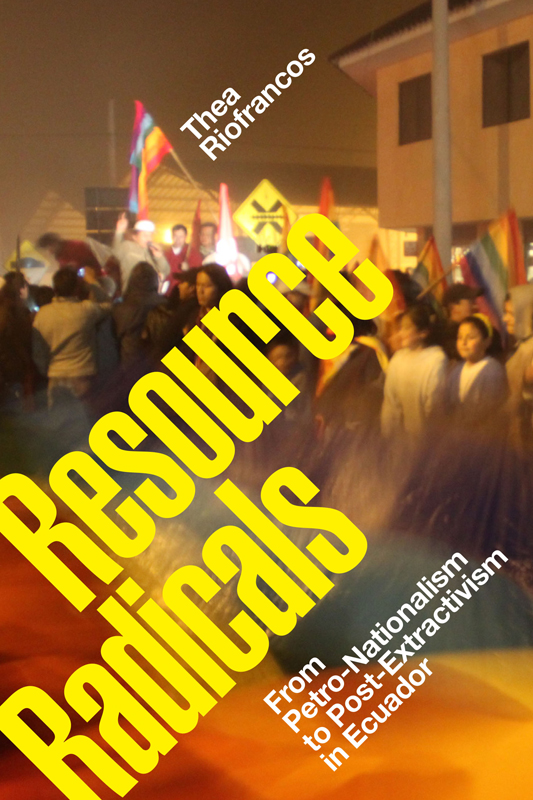RadicalAmricas
A series edited by Bruno Bosteels and George Ciccariello-Maher
Resource Radicals
From Petro-Nationalism to Post-Extractivism in Ecuador
Thea Riofrancos
Duke University Press
Durham and London
2020
2020 Duke University Press
All rights reserved
Printed in the United States of America on acid-free paper
Designed by Drew Sisk
Typeset in Portrait Text and Helvetica Neue by Westchester Publishing Services.
Library of Congress Cataloging-in-Publication Data
Names: Riofrancos, Thea N., author.
Title: Resource radicals : from petro-nationalism to post-extractivism in Ecuador / Thea Riofrancos.
Other titles: Radical Am ricas.
Description: Durham : Duke University Press, 2020. | Series: Radical Am ricas | Includes bibliographical references and index.
Identifiers: LCCN 2019046729 (print)
LCCN 2019046730 (ebook)
ISBN 9781478007968 (hardcover)
ISBN 9781478008484 (paperback)
ISBN 9781478012122 (ebook)
Subjects: LCSH : Mineral industriesPolitical aspectsEcuador. | Mineral industriesGovernment policyEcuador. | Economic developmentEnvironmental aspectsEcuador. | Natural resourcesPolitical aspectsEcuador. | Energy policyEcuador. | Environmental policyEcuador.
Classification: LCC HD 9506. E 22 R 56 2020 (print) | LCC HD 9506. E 22 (ebook) | DDC 333.809866dc23
LC record available at https:// lccn .loc .gov /2019046729
LC ebook record available at https:// lccn .loc .gov /2019046730
Cover art: Elisa Levy, El agua baila en la Wiphala, 2012. Courtesy of the artist.
CONTENTS
This book began before I knew it would be a book, before I knew I would be admitted into a PhD program, and before I knew I was conducting what would in hindsight constitute the preliminary fieldwork for my dissertation. It was born in late 2007 with a decision that was equal parts spontaneous and deliberate to move to Ecuador with Daniel Denvir, my partner and co-adventurer then and since. We were drawn by the countrys natural landscapes, rebellious uprisings, and by what we understood was the beginning of a momentous political transformation: after decades of social mobilization, the countrys first democratically elected leftist president had been inaugurated, and had promised a constituent assembly to rewrite the constitution, an end to the long night of neoliberalism, and sovereignty from US hegemony. Over the three years prior to this decision, Daniel and I had been active in PCASC , a Portland-based Latin American solidarity organization, and had lived and traveled elsewhere in the region where the Left had already come to power. We knew that the Lefts electoral ascent was marked by both heady optimism and fraught relationships with the wide array of movements that had long struggled for social justice and popular power. We wanted to see how this process would unfold in Ecuador. Right away, we learned that resource extraction and indigenous rights would form the intertwined sites of contestation between the leftist government and the social movements that were still, at that moment but not for much longer, its allies.












